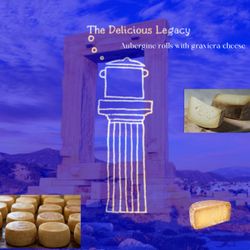Share
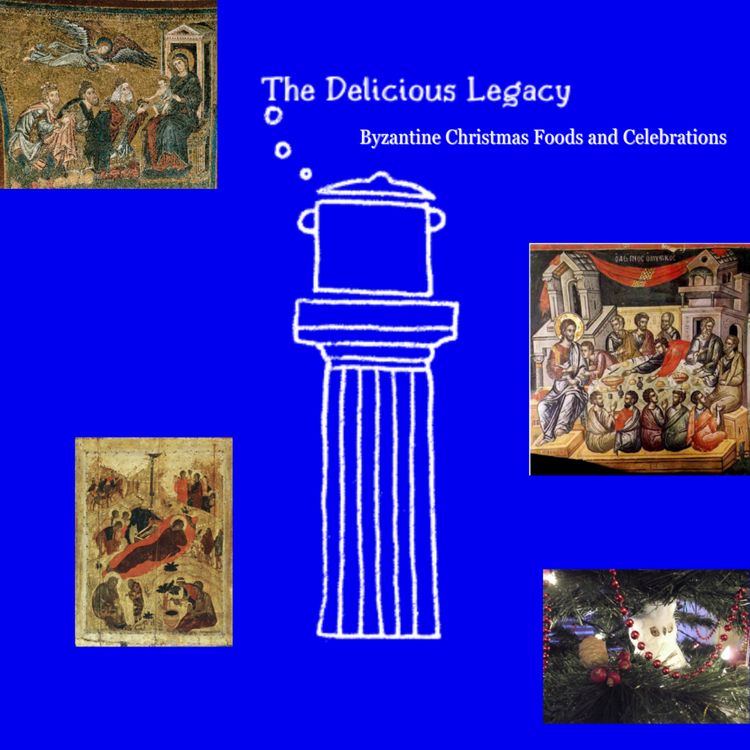
The Delicious Legacy
Byzantine Christmas Foods and Traditional Greek Christmas Recipes
Merry Christmas to all!
Happy holidays and a delicious New Year!
So I have a festive episode for you! Out now, and the last one for the year!
Christmas in the Emperor's Palace in Byzantine Constantinople...
How did the Emperor entertained his guests in Christmas time? What food was advised to be eaten for the celebrations?
Also, what is some traditional modern Greek dishes for Christmas from my home town of Veria?
I have some exclusive and delicious recipes for your ears and only!
Enjoy!
The following talented human beings wrote the music for this episode:
Music by Argyris Ottas,
https://soundcloud.com/argymusic
Pavlos Kapralos
https://www.youtube.com/channel/UCzgAonk4-uVhXXjKSF-Nz1A
and Miltos Boumis.
Support the podcast on Ko-Fi and Patreon for ad-free episodes!
More episodes
View all episodes
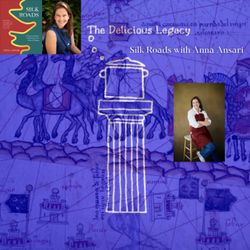
29. History of Food in Central Asia Pt2 - From Baku to Beijing!
01:03:28||Season 7, Ep. 29Hello!This is part two of my conversation with the fantastic Anna Ansari about her book "Silk Roads" and the food of Central Asia.From Baku to Beijing!Origins, trade routes, influences, and what is the connecting thread behind it all?Plus a lot of personal stories, especially with melon! Personal dramas of melon!Find out more, here!You can buy Anna's book from my affiliate link at bookshop.org:https://uk.bookshop.org/a/17049/9780241694374Enjoy!Thom & The Delicious Legacy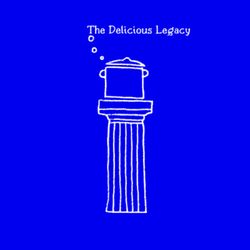
Batzina - An easy filo-less pie from Thessaly!
10:11|Hello!Your recipe of the week on a Saturday is out!Thessaly. The flat and fertile land of Central Greece, famed since ancient times for their horses and cavalry that provided the strategic support for Alexander The Great's campaign on his conquest of the Persian Empire.Our task today -and recipe from the region- will be a lot easier than conquering a continent and subduing the world's mightiest empire! We just need to cook this delicious dish and eat it with family or friends.Let's find out how to make it, and the ingredients!Bon Appetit! Music by Miltos BoumisEnjoy,Thom & The Delicious Legacy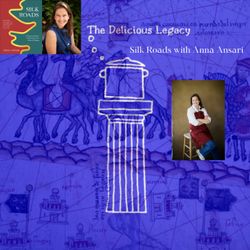
28. History of Food in Central Asia Pt1
47:17||Season 7, Ep. 28Melons. Spinach. Sheep tail fat.Spices. Bazaars. Enough tales to tantalise even the most incurious mind!Hello my curious archaeogastronomers!A new episode is here for your enjoyment!This time I have the great honour to have the fantastic Anna Ansari as my guest.We talk all about food, history and cultures of the cultures in Central Asia aka "Silk Roads" and her own personal story.I hope you'll enjoy this fantastic epic adventure!You can find Anna here on her website:https://www.annaansari.com/aboutAnd Instagram:https://www.instagram.com/thisplacetastesdelicious/?hl=enYou can buy Anna's book from my affiliate link at bookshop.org:https://uk.bookshop.org/a/17049/9780241694374Lots of loveThom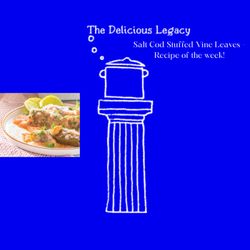
Cod Stuffed Vine Leaves: Recipe of the Week on Saturday
10:33|Hello!Today's recipe on a Saturday is Salt Cod Dolmades with tomatoey avgolemono (egg lemon) sauce:A Delicious Peloponnesian recipe for the winter times.In the interior of the Peloponnese, where fresh fish was rare dried fish such as cod became staple.Enjoy!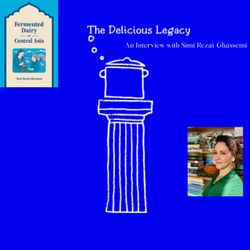
27. A History of Fermented Dairy in Central Asia - From the steppe to space!
01:02:00||Season 7, Ep. 27Hello my curious archaeogastronomers!A brand new episode is out, and it's all about the long history of fermented dairy foodstuffs from the vast regions of Central Asia.Fermented dairy products from Central Asia have been to space! Resilient and nutritious, and good for the bronze age and the space age, are truly interstellar travelers of our civilization!We all know yoghurt and kefir but have you heard of kumis, chortan, gooroot?For this reason I 've employed the expertise and knowledge of Dr Simi Rezai Ghassemi, to tell me all about the amazing, uknown, and life giving fermented dairy products of Central Asia countries, from Azerbaijan, to Iran, all the way to Mongolian steppe!The 4000 year old mummified remains of a woman known as "The Beauty of Xiaohe" have fermented dairy (kefir? cheese?) as necklace. A seemingly unbroken tradition of drying and preserving dairy for the long harsh environments of Central Asia since time immemorial...So who indeed invented the first kefir? This side of Caucasus or the desserts of China?All the above and much more on today's episode!More about the mummies found in Tarim Basin:https://www.penn.museum/sites/expedition/ancient-mummies-of-the-tarim-basin/Find out more about Dr Simi below:Web: https://simiskitchenblog.wordpress.comSubstack: https://srezaighassemi.substack.comIntagram: https://www.instagram.com/simiskitchen/Equinox: https://equinoxpub.com/projects/fermented-dairy-of-central-asiaFrom bookshop.org:https://uk.bookshop.org/a/17049/9781800507029Anyway enjoy our fascinating chat here!Love,Thom & The Delicious Legacy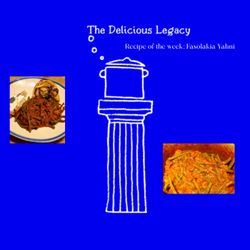
Sunday Recipe of the Week: Fasolakia Yahni (aka Greek Green Bean Stew)
07:55|Hello!New recipe of the week is out!This one is called "Fasolakia Yahni" and it's a classic of the "lathera" family of dishes, usually vegetarian. The name means "oily" aka cooked in lots of great Greek extra virgin olive oil! With music from Miltos Boumis.Enjoy!LoveThom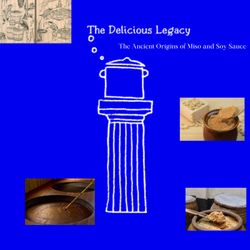
26. The Ancient Origins of Miso and Soy Sauce
57:43||Season 7, Ep. 26Hello!Brand new episode is out and I'm excited about it!World fermentation day was on February 1st, just three days ago.And what better way to celebrate with two amazing inventions of humankind?Is miso the most astounding transformation in the world of fermentation?From ancient Chinese meat and fish based pastes to Buddihst monks taking the craft to Japan the story of Miso and Soy Sauce has a long long at least three thousand year old history!Ok, enjoy today's episode!Some links:Excellent traditional soy sauce maker:https://kaneyoshi.co/english/Kioke Shoyu Brewers Revival Youtube channel:https://www.youtube.com/watch?v=K72eethJuU8&list=PLkakkeid1iaj55xr57PzNV-w7uKDLE-Eb&index=1https://kioke.jp/en4-brewersMy links/ recommendations for the week:Aubergines Braised With Trahana | My Greek Table with Diane Kochilas:https://www.youtube.com/watch?v=N5ni0hu7UDQGreek Farms | Apaki & Syglino: Taste Greece’s Tradition:https://www.youtube.com/watch?v=dinXaNT2LlMHow Extra-Virgin Olive Oil Is Made In Greece | Regional Eats | Food Insider:https://www.youtube.com/watch?v=l4GrYUUcQG0Sources:https://archive.org/details/bookofmisosavory0000shur_j6b4/page/20/mode/2uphttps://www.theguardian.com/world/2025/may/21/without-time-there-is-no-flavour-a-south-korean-grand-master-on-the-art-of-the-perfect-soy-sauceThe Noma Guide to Fermentation: Rene Redzepi & David ZilberEnjoy!Thom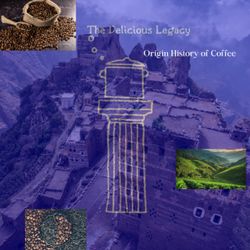
25. Origin History of Coffee (Reprise)
52:31||Season 7, Ep. 25Hello!What happened in Paris in 1669 that ushered the fashion of Coffee in France?What's the popular myth of the introduction of coffee in Europe and the cafe culture that has to do with the siege of Vienna?And how an Ethiopian goat herd named Kaldi is credited with the discovery of coffee?All this and more, exploring the long history of coffee and it's myths from the Cloud forests of Ethiopian highlands to the deserts of Arabia and beyond on this episode!Enjoy! Sources and Credits for this episode:Books:-A people's history of coffee and cafés by Biderman, Bob-The devil's cup : coffee, the driving force in history by Allen, Stewart Leehttps://insidearabia.com/coffee-the-lost-treasure-of-yemen/ And podcasts that deal with the subject in much more detail:A History of Coffee:https://www.spreaker.com/user/filterstories/episode-1-draft-8-ahoc-channelOriginal Music by Pavlos Kapralos & Miltos BoumisMotion Array Music:-UNCOVERING THE TRUTH A Rhian Talisein Sheehan Karl Solve Steven-Ashot Danielyan - Above The Long Desert- Arabia- Spirit of Oman-EMilarMusic&Audio_Shattered_StoneThat's it!Now go and listen to the episode!